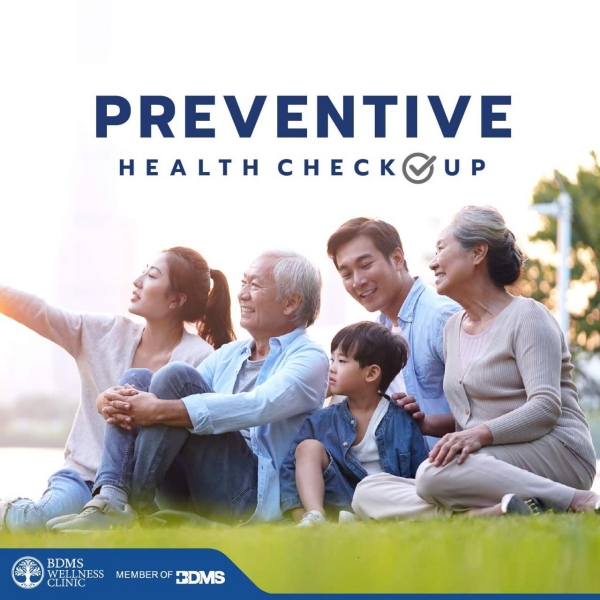Preventive Health Check-up
The definition of good health is to have a healthy physical and mental well-being. Good health means you’re able to have overall improved well-being and interpersonal relationships with others in daily life. To achieve good health, many focus on a healthy diet, avoiding sugary foods and opt for low fat and low sodium diet, exercise regularly, get enough sleep and avoid alcohol and smoking.
Taking care of yourself is a wonderful thing to do, but it may not be enough for us to ensure that we will stay healthy as the risk of illness tends to continue to rise in this day and age. Those risks are from the pollution such as dust, smoke, PM 2.5, chemical residues found in food and virus. The world around you can weaken a healthy body, especially when one lives a stressful life, with lack of sleep which increases the risk of non-communicable diseases such as diabetes, high blood pressure, heart disease and cancer.
That is why doctors are trying to research for not only the cure for the disease, but also for preventive actions to keep illness at bay, known as Preventive Medicine, which helps slow down and prevents various diseases. The risk can be screened far more in advance than conventional medical examinations in the past, such as the Preventive Health Check-up. The procedure analyzes the patient down to the genetic level so that doctors can plan for more personalized care and prevention. This is different from post-illness treatment or the same treatment regimen for all patients (one size fits all) that may no longer be able to meet their health needs.

Here are some examples of preventive health check-ups
1.Genetic Analysis
Human body is made up of millions of cells. Each cell contains a chromosome which holds a genetic chain or ‘DNA’, shaped like tangling spirals. In the genetic chain, there are amino acid sequences called genes. They are responsible for inheritance from our parents, and act like the body’s blueprint determining individual differences. The risk of disease such as cancer, cardiovascular disease, diabetes or even obesity can be inherited. If we know the risk of developing these diseases in advance, it would allow us to reduce risk factors in future.
2. Body Age (Telomere Length)
The telomere is located at the ends of a chromosome. Their job is similar to the plastic cap at the tip of your shoelace; they prevent chromosomes from deterioration. Telomere can be used to determine your biological age and your cellular degeneration or degenerative status, which can occur at varying life stages. Some people can be young but they can have the same cell age as the elderly. Knowing the length of the telomere can tell whether the body has deteriorated beyond normal range. If you have a short telomere length, you are at higher risk of developing diseases than normal people and may also have a shorter life expectancy. But don’t let that scare you, it is the best to have your telomere length checked so the doctors can be aware of your risks and you can take better care of yourself, adopting a healthier lifestyle and live longer.
3. Immune Status Screening (NK Cell Activity)
This type of screening testes the ability of NK cell (Natural Killer cell) in order to assess the effectiveness of the body's immune system against cancer cells and viruses. When our body’s immune system is not functioning properly, it becomes less effective against germs or foreign bodies which makes us sick, each time for a long time. Symptoms of sickness may appear to be more severe with individuals that have low immunity, than those with normal levels of immunity. It can lead to a disease such as herpes and shingles. The higher values of reference indicate that the cells involved in the immune system are doing their job well. The test can also show that your body has an infection or is at risk of developing an immune-mediated disease such as SLE or rheumatoid arthritis.
If the doctor has found that your body has a level of NK Cell function that is lower than normal, they can strengthen the immune system by introducing balance to the patient's body which can be done in various ways. An advice on a healthier lifestyle, supplementing with immune boosters such as a cordyceps extract mixed with vitamin C, a variety of mushroom extracts that stimulate the activity of white blood cells; are just a few things you can do for a healthier immune system.
4. In-depth analysis
Most of us live in a modern urban environment which triggers free radicals. This will cause our body to wear out faster than ever before. An in-depth health check is a great way to keep sickness at bay and this includes vitamin level check and knowing the level of minerals, hormones and the level of antioxidants, which can help reduce inflammation in the body and reduce the risk of developing serious diseases. In-depth analysis allows a medical professional to use hormone replacement therapy extracted from nature. Customized supplements designed based on your body analysis, and remember, to maximize health benefits, consume vitamins based on your own blood test. When nutrients are at a balanced level, and optimized for your own body, giving you good health from the inside out.
5. Cardiovascular health check
Heart disease is the number 1 cause of death in the world, which at times is a result of a careless lifestyle. Not getting enough sleep, continuous stress, eating poorly and lack of physical movement, all of these factors contribute to weight gain. What comes after that are high blood pressure, high levels of fat and sugar in the blood. Regular blood tests to measure your fat and sugar levels help you make better food choices. Same goes for regular testing of stress hormones (Cortisol) and anti-stress hormones (Dehydroepiandrosterone; DHEA) as your body may experience stress without knowing it. Body scanning for fat deposits in your internal organs using DEXA (Dual energy x-ray absorptiometry) and MRI (Magnetic resonance imaging) methods are effective, because weight alone is not enough to tell whether you are obese. In addition, have a dental examination for the presence of streptococcal infection, which causes inflammation and damage to certain tissues of your heart. Try to utilize these preventive check-ups when you can, so you can stay in control of your health.
6. Food Intolerance
Food intolerance is different from food allergy, since symptoms do not occur immediately. Instead, symptoms can occur after at least 2-3 days after eating certain foods that your body cannot tolerate, which may cause discomfort, chronic fatigue, flatulence, bloating, digestive system, reduced in nutrient absorption, trouble controlling weight, tiredness, headache, migraine, acne, rash, muscle pain and more. These symptoms can affect long-term health and turn this into a chronic disease such as diabetes, osteoporosis, anemia, coronary artery and even develops allergies. You should treat these intolerances seriously, since nowadays, more than 20% of people in the world have problems with food intolerance, and observing the symptoms by yourself may not guarantee accuracy. That is why you need a thorough examination of blood results from the laboratory, in addition to professional prevention plan.
The food intolerance check-up is to test the body's reaction to Immunoglobulin G4 (IgG4) on 232 kinds of foods. The results will help you adjust which eating habit to avoid in the future in order to reduce the risk of illness and symptoms that is caused by food.
Preventive health checks under the supervision of a medical professional help you pay more attention to your body and turn your life around for the better, whether it’s the change in eating, exercise or adopting meditation. Not only does it prevent illness but these health checks can also help to maximize health benefits, slow down aging, so you can live a long, healthy life.
Reference
- Blackburn EH. Telomeres and telomerase: the means to the end (Nobel lecture). Angewandte Chemie International Edition. 2010 Oct 4;49(41):7405-21.
- Lobo V, Patil A, Phatak A, Chandra N. Free radicals, antioxidants and functional foods: Impact on human health. Pharmacognosy reviews. 2010 Jul;4(8):118.
- Ogata K, Yokose N, Tamura H, et al. Natural killer cells in the late decades of human life. Clin Immunol Immunopathol 1997;84:269–75.
- Janeway Jr CA, Medzhitov R. Innate immune recognition. Annual review of immunology. 2002 Apr;20(1):197-216.
- Cheent K, Khakoo SI. Natural killer cells: integrating diversity with function. Immunology. 2009 Apr;126(4):449-57.
- Parkin DM: The global health burden of infection-associated cancers in the year 2002. Int J Cancer 118 (12): 3030-44, 2006.



.jpg)
